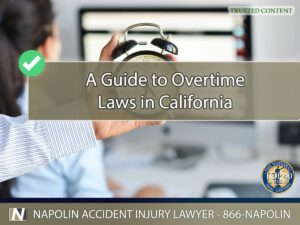A Guide to Overtime Laws in California
California stands at the forefront of protecting workers' rights, particularly when it comes to compensation for overtime work. Under the state's rigorous labor laws, employees are entitled to fair pay for extended hours, ensuring that hard work beyond the standard workweek is adequately rewarded. This article serves as a guide to help you understand your rights under these laws, which are among the most favorable in the nation for employees.

Who is Eligible for Overtime Pay in California?
Who is Eligible for Overtime Pay in California?
Understanding who is eligible for overtime pay is crucial for every worker in southern California. The state categorizes employees as either exempt or non-exempt, a classification that significantly affects eligibility for overtime pay:
- Non-exempt employees are entitled to overtime pay.
- Exempt employees are not eligible for overtime pay. This group typically includes professionals, managers, and certain administrative roles.
Specific Exclusions from Overtime Eligibility
Certain job types are specifically excluded from overtime requirements under California law. These exclusions often include outside salespersons and some types of professional roles, such as licensed physicians and surgeons. It is essential for workers to verify their job classification to understand their rights fully.

Understanding Overtime Pay Rates in California
Understanding Overtime Pay Rates in California
Overtime pay rates in California are generously designed to compensate workers for long hours. The state mandates that:
- Employees receive ‘time and a half' (1.5 times the regular rate) for hours worked beyond 8 hours in a day or 40 hours in a week.
- ‘Double time' (twice the regular rate) is required for hours worked beyond 12 in a single day or for all hours worked beyond 8 on the seventh consecutive day of a workweek.
These rates ensure that employees are compensated fairly for their extended work hours, providing significant financial incentives for employers to manage work schedules without excessive overtime.
Legal Protections for Overtime
California's overtime regulations are anchored in California Labor Code 510, which outlines the rights of workers and the obligations of employers regarding overtime pay. This legal framework is designed to ensure that workers are not exploited through excessively long work hours without appropriate compensation. The state's standards are reinforced by the Federal Fair Labor Standards Act (FLSA), which provides a baseline of protection, although California's laws often offer more substantial benefits to employees.
The FLSA establishes minimum wage, overtime pay, recordkeeping, and youth employment standards affecting full-time and part-time workers in the private sector and in Federal, State, and local governments. In California, these protections are expanded to provide one of the most comprehensive frameworks for worker compensation in the United States.
Claiming Unpaid Overtime
If an employer fails to pay the required overtime wages, employees have the right to claim what they are owed. The process typically involves:
- Gathering detailed documentation of hours worked and wages paid.
- Filing a complaint with the California Labor Commissioner's Office, which enforces state labor laws.
Taking timely action is essential as there are statutory limits on how long you have to make a claim. Understanding these steps and preparing in advance can greatly simplify the process of recovering unpaid wages.
Common Misconceptions and Mistakes Regarding Overtime in California
Misunderstandings about overtime laws can lead to disputes and loss of wages. Here are some common misconceptions that both employers and employees often have:
- Belief that salaried employees are not eligible for overtime: Many assume that all salaried positions are exempt from overtime, which is not true. Exemption depends on specific job duties and salary thresholds.
- Incorrect calculation of the overtime rate: Overtime must be calculated based on the regular rate of pay, which includes all earnings, not just hourly wages.
- Assuming overtime is based only on weekly hours: In California, overtime is calculated daily, which is a unique provision compared to many other states.
Understanding these nuances is crucial for both employers and employees to ensure compliance with the law and safeguard against potential financial liabilities.

A Guide to Overtime Laws in California
A Guide to Overtime Laws in California
Understanding California's overtime laws is essential for employees seeking to ensure they are compensated fairly for their contributions to their employers. If you believe your overtime pay has not been calculated correctly, or if you have been wrongly classified as exempt from overtime, it’s crucial to seek knowledgeable legal assistance.
At Napolin Accident Injury Lawyer, we have extensive litigation experience representing workers in southern California to secure their rights under the law. If you are facing issues with unpaid overtime or other employment disputes, call us at (909) 962-8415 to schedule a free consultation. Our expert team is ready to help you understand your rights and fight for the compensation you deserve. Remember, protecting your labor rights is not just about securing unpaid wages; it's also about upholding the principles of fairness and respect in the workplace.
